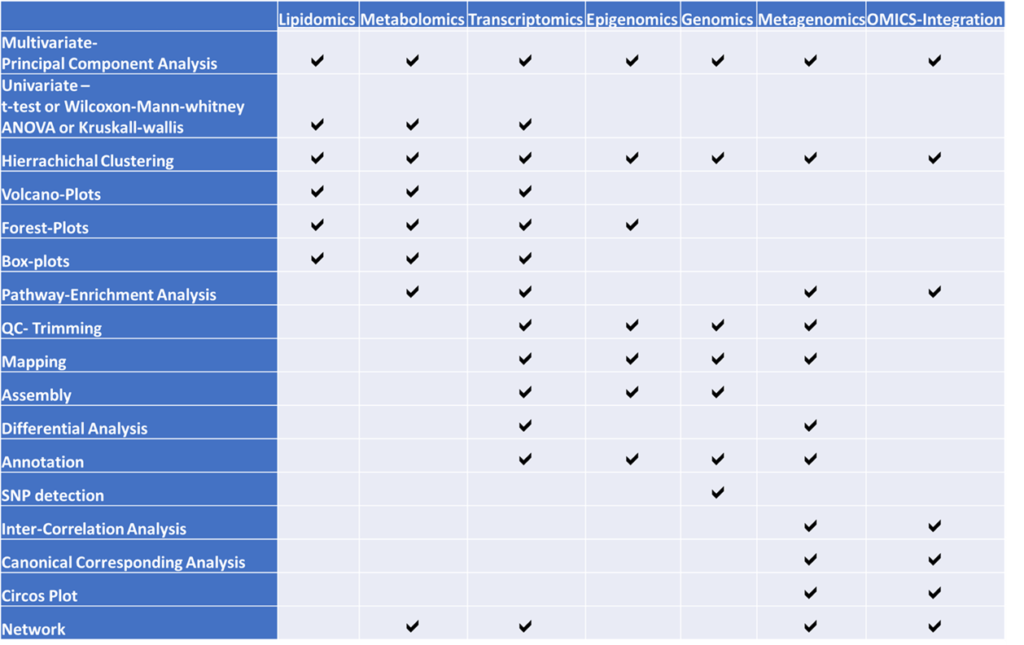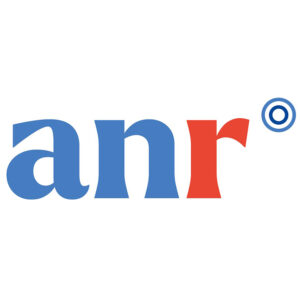Our ICAN I/O platform – Data sciences
In today’s scientific and medical fields, the generation of megadata or “Big Data” is developing the use of mathematical modelling, statistics and artificial intelligence. These tools are essential for effectively managing and analysing health data, revolutionising approaches to biology.
- ICAN I/O is a platform of expertise focused on the analysis and integration of multi-omics data, biomarker discovery and clinical research. Our aim is to ensure secure data management throughout its lifecycle, in compliance with the requirements of the RGPD.
- The platform goes hand in hand with the evolution of modern technologies and the use of robust algorithms to meet research objectives through a collaborative and holistic approach integrating multi-omics technologies and statistical analysis.
- The team includes data managers and a data scientist, all of whom have a wealth of experience gained from working on national and international projects, in collaboration with leading scientists, doctors and researchers on a wide range of scientific subjects.
- Thanks to this expertise, the ICAN IHU is positioned as a major international player capable of generating massive health data.

Major projects in progress
MAESTRIA: Machine Learning Artificial Intelligence Early Detection Stroke Atrial Fibrillation
- Consortium of 18 partners from Europe, the United States and Canada responding to an H2020 call for projects on digital diagnostics.
- A highly innovative project to improve the detection of atrial cardiomyopathy, which is responsible for the onset of atrial fibrillation and embolic vascular accidents, using machine learning and AI (Artificial Intelligence).
- The ICAN I/O Data Science team plays a central role in integrating multimodal data (imaging, clinical, omics) to improve diagnostic accuracy and identify new therapeutic targets, thereby increasing the effectiveness of treatment and preventing complications.
- The ICAN I/O team is also leading the development of the MAESTRIA demonstrator, an innovative digital platform designed to guide atrial fibrillation risk assessment and management, improve diagnosis and support treatment decisions through a scalable, user-centric approach.
ARTEMIs : AcceleRating the Translation of virtual twins towards a pErsonalised Management of fatty lIver patients
- The ARTEMIs project is developing ‘virtual twins’ using computer models and machine learning, integrated into a Clinical Decision Support System ( CDSS) for the management of metabolic fatty liver disease (MFLD) .
- Targeting a disease that affects 25% of the population, ARTEMIs also focuses on early intervention for the cardiovascular complications associated with FAD.
- The system aims to personalise treatment by predicting the course of the disease, assessing the effectiveness of treatments and encouraging a healthier lifestyle.
- The project concludes with a proof-of-concept study to assess the effectiveness of this integrated approach in a clinical setting.
MEDITWIN: using digital twins to develop tomorrow’s personalised medicine
- Consortium comprising 7 University Hospital Institutes (IHUs) , including ICAN, Nantes University Hospital, Inria, associated start-ups and Dassault Systèmes
- Project France 2030 announced on Monday 11 December 2023 in the presence of French President Emmanuel Macron.
- Using personalised virtual twins of organs, metabolism and cancerous tumours
- 5 years, from 2024 to 2029
- Aims: provide a diagnosis of the risk of cardiovascular disease for high-risk patients andhelp specialist doctorschoose treatments for effective patient follow-up
RESIST-PP: the link between diet, innate immunity and the risk of infection
- An EU-funded project to explore how high-fat diets induce postprandial inflammation and atherogenic dyslipidaemia via metabolic endotoxaemia influenced by gut microbiota.
- The project aims to study the impact of bacteria-derived metabolites on the susceptibility of obese and diabetic patients to infections, to analyse the interactions between immune cells and the blood microbiota, and to carry out studies on mouse models.
- The ICAN I/O platform is participating in this project by integrating multimodal data, improving our understanding of the risks of diet-induced infection and developing new treatment and prevention strategies for metabolic and infectious diseases.
Database management and curation
Paper CRF
Protocol reading
Paper CRF revision
Paper CRF validation
Edit Checks
Creation and validation of the Data-Validation Plan
Development / Test / Validation – Selection of mandatory fields
Documentation
REDCap User Guide
Study entry guide
Data-Management Study Plan
ECRF maintenance and data quality control
Correcting problems
New version / Amendment
User management
Creation of queries
ECRF creation
List of variables
Implementation in REDCap
Testing the CRF
Validating the CRF
Creation of user accounts
Go live
Extraction
Data extraction / Dataset creation
External data
Link with external data
Monitoring
Providing the monitor with a fraction of the data to be monitored
Multimodal integration
- The ICAN I/O platform specialises in multimodal integration and is actively involved in a number of national and European projects focusing on omics studies, working closely with the ICAN Omics Lipidomics and ICAN Omics Metabolomics platforms .
- ICAN I/O uses a range of analyses from classical statistical analysis to advanced machine learning algorithms to achieve study objectives.
- The ICAN I/O team is continually developing custom visualisation tools to improve the presentation and interpretation of results.
- The platform’s solid experience is backed up by several major scientific publications that demonstrate its expertise.
Clinical research and biomarker discovery
- The ICAN I/O platform has extensive expertise in statistical and machine learning techniques applied to clinical research in cardiometabolism.
- It develops statistical analysis plans and carries out analyses in descriptive, multivariate and longitudinal time-series disciplines using various statistical models. The platform’s expertise extends to risk prediction, discriminant analysis, model calibration and validation, and advanced classification methods such as clustering and ROC analysis. It also manages propensity score matching, competitive risk analysis, Kaplan-Meier survival analysis and multiple imputation followed by sensitivity analysis.
- In the field of machine learning, ICAN I/O uses ensemble methods, XG Boost, Random Forest, SVM and PLS-DA, customised to meet the requirements of specific studies and data types. It focuses on technologies such as explainable AI, causal inference and deep phenotyping, and uses automated ML and incremental learning to improve data processing.
- The platform has developed web applications based on XG Boost for clinical use, discovered prognostic markers and biomarkers, and developed clinical scores, securing its leadership with 2 international patents on biomarkers.
- Its innovative approach is highlighted by multiple high-impact publications in journals such as The Lancet, European Heart Journal, Nature Cell Biology, etc.
Scientific Committee
- Dr. Antonio GALLO, MD, Ph.D (APHP)
- Dr. Wilfried Le Goff ,PhD (UMR 1166 ICAN)
- Pr. Matthieu Schmidt, MD, Ph.D (APHP)
- Dr. Xavier Fresquet, PhD (SCAI)
Scientific publications
01/02/2024
Left atrial strain: A memory of the severity of atrial myocardial stress in atrial fibrillation
09/12/2022
Impacts of a high-fat diet on the metabolic profile and the phenotype of atrial myocardium in mice
01/12/2022
A diagnostic proposal for sarcopenic obesity in adults based on body composition phenotypes
01/08/2022
Persistence of severe liver fibrosis despite substantial weight loss with bariatric surgery
11/12/2021
Predicting 90-day survival of patients with COVID-19: Survival of Severely Ill COVID (SOSIC) scores









